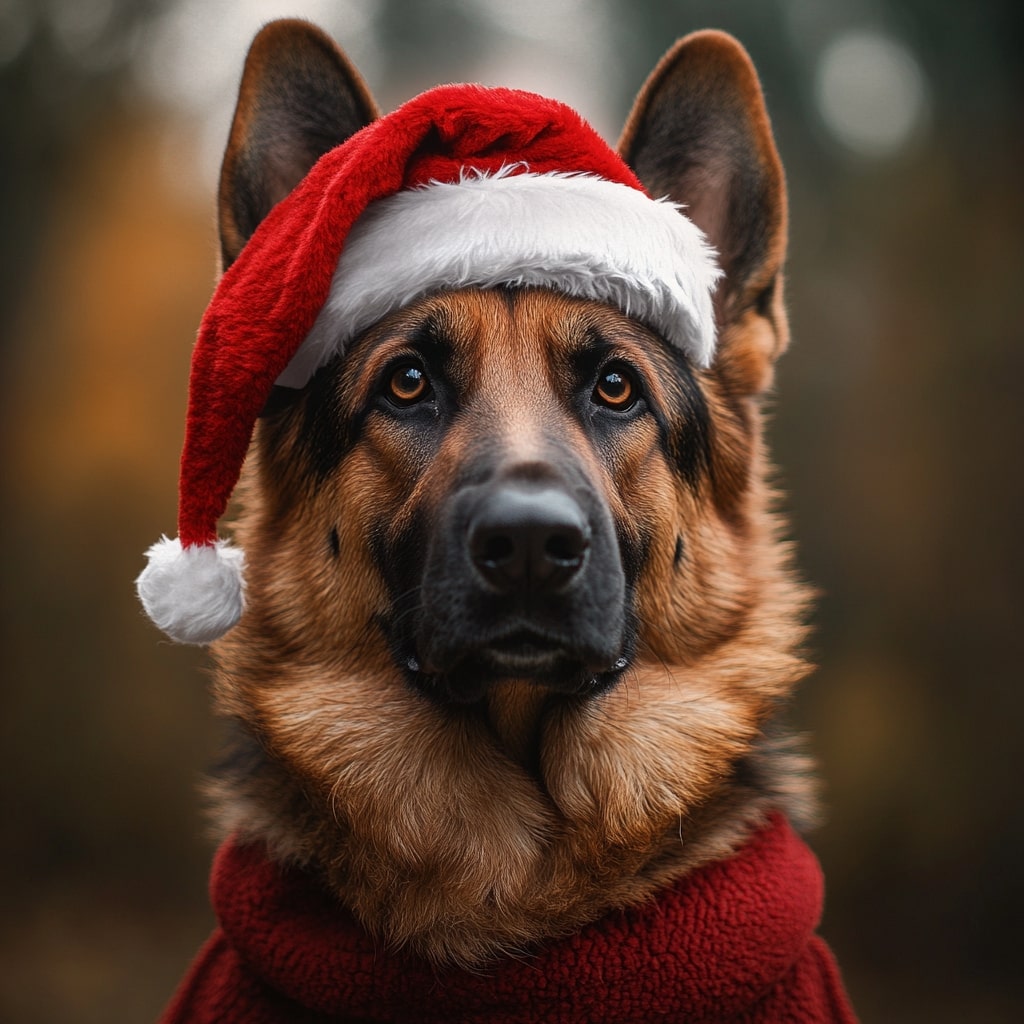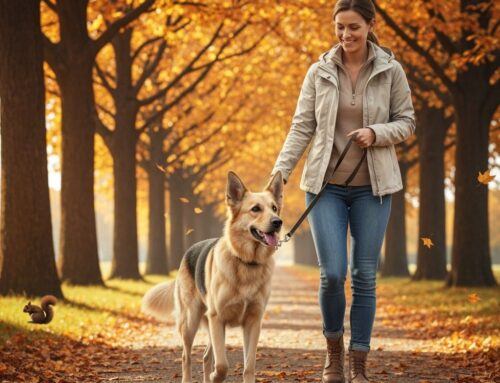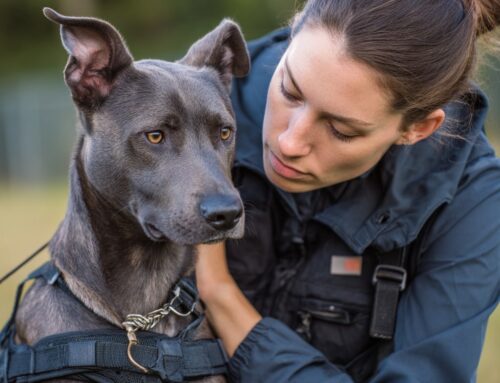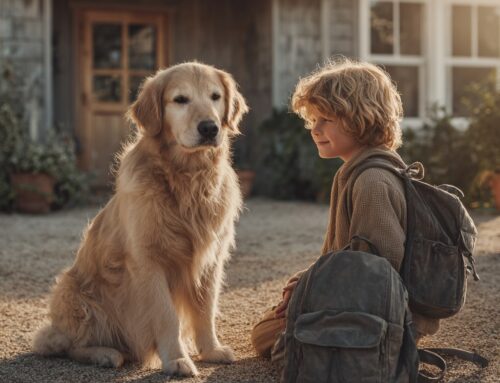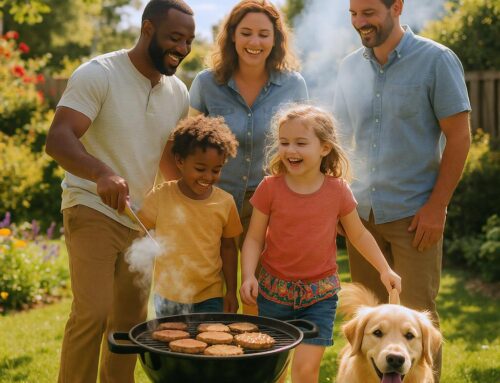The holidays are a joyful time filled with family, friends, and festive gatherings. But for your dog, these changes in routine and an influx of visitors can sometimes be overwhelming for the upcoming holidays. Preparing your dog for holiday guests not only helps them feel more comfortable but also ensures a stress-free experience for everyone involved. Here’s a guide to help you keep your dog calm during gatherings while fostering positive interactions with your guests.
Understanding Your Dog’s Behavior
Every dog reacts differently to visitors and holiday commotion. Some may thrive on the extra attention, while others may feel anxious or overstimulated during your holiday plans. Common signs of stress in dogs include excessive barking, pacing, having separation anxiety, hiding, or even displaying behaviors like jumping or nipping.
Understanding your dog’s behavior is the first step in preparing them for the holidays. Assess whether your dog tends to be excitable or nervous around new people or other dogs and tailor your approach to meet their specific needs. If your dog has a history of reacting negatively to strangers, it’s important to do focused training with gradual exposure in the weeks leading up to the holidays. This proactive approach will set them up for success when the big day arrives.
Introduce Gradual Changes Before the Dog Training Holiday Season
Dogs thrive on routine, so any major disruption to their environment can be unsettling. To help your dog adjust to the holiday season you’ll want to do some dog training before the holiday season.
1. Rearrange Furniture in Advance
If you plan to move furniture to accommodate guests or decorations, do so well ahead of time. Gradual changes help your dog acclimate to the new layout. Make sure to maintain access to familiar areas they enjoy, like their favorite corner or window spot.
2. Practice Handling New Items
Introduce your dog to decorations, new smells, or other holiday-related items slowly. Allow them to sniff and explore these objects in a controlled environment. Avoid decorations that might scare them, like noisy or animated ornaments, and secure items that could be easily knocked over.
3. Simulate Guest Arrivals
Before the actual event, practice guest arrivals by having a friend or neighbor visit. This allows your dog to experience the situation in a low-pressure setting. Reward calm behavior with treats and praise. Consistent practice will help normalize the process of guests entering your home, reducing stress when the holidays arrive.
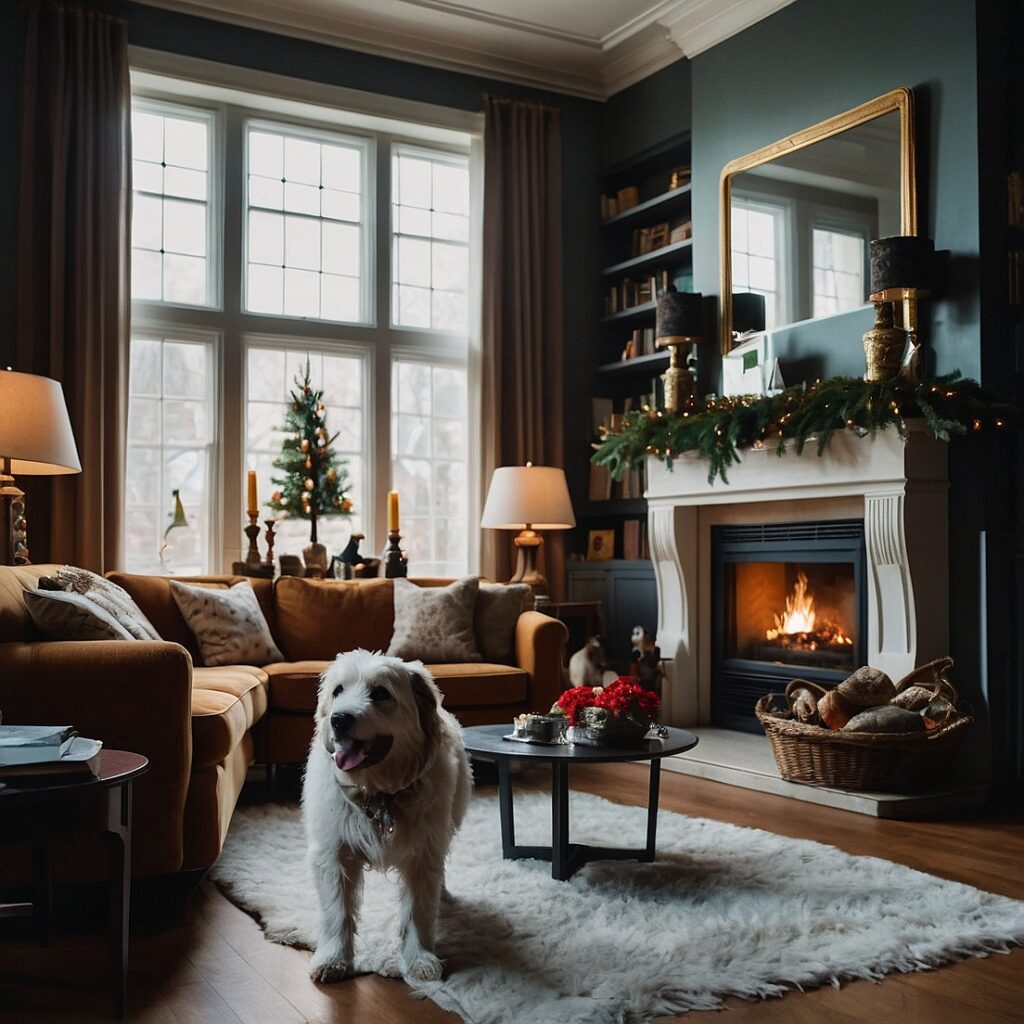
Establish a Safe Space
Creating a designated safe space for your dog is one of the most effective ways to manage holiday stress. A quiet, comfortable area can serve as a retreat when your dog feels overwhelmed and reduce stress.
1. Choose a Familiar Spot
Select a location your dog already associates with safety, such as their crate, a bedroom, or a cozy corner of the house. This space should be off-limits to guests to ensure your dog has uninterrupted quiet time when needed.
2. Make It Inviting
Add soft bedding, toys, and perhaps an item of your clothing to provide comfort. Consider playing soothing music or possibly using a white noise machine to help block out loud holiday sounds that may make your dog nervous or feel anxious.
3. Introduce the Space Early
Encourage your dog to spend time in their safe space before the gathering. Use treats and positive reinforcement to create a positive association. During the event, regularly check on your dog to ensure they’re comfortable and not feeling isolated.
Training Tips for Managing Excitement and Anxiety
The holidays are a great time to reinforce basic training commands that will help your dog remain calm and well-behaved. Preparing your home and practicing dog training with basic commands will help get your dog ready for the excitement of holiday gatherings. Focus on these key commands:
1. “Place” Command
The “place” command teaches your dog to go to a specific area, such as a mat or bed, and stay there until released. Practice this command daily and reward your dog for staying calm in their designated spot. This is particularly helpful during meals or when guests first arrive, as it provides a controlled way to manage your dog’s behavior.
2. “Sit” and “Stay”
These foundational basic commands are essential for controlling excitable dogs. Use them to prevent jumping or unwanted attention-seeking behavior when guests arrive. Make training sessions short and fun to keep your dog engaged without overwhelming them.
3. “Leave It” Command
Holiday decorations and food can be tempting for dogs. The “leave it” command helps prevent your dog from grabbing items they shouldn’t have, keeping them safe and avoiding potential mishaps and self control. Start with low-value items and gradually work up to high-value distractions like treats or decorations.
4. Controlled Greetings
If your dog tends to jump on guests when overly excited, try to train them to sit calmly before receiving attention. Practice by having a friend enter your home and greet your dog only when they are sitting politely. This sets clear boundaries and helps reinforce good behavior consistently.
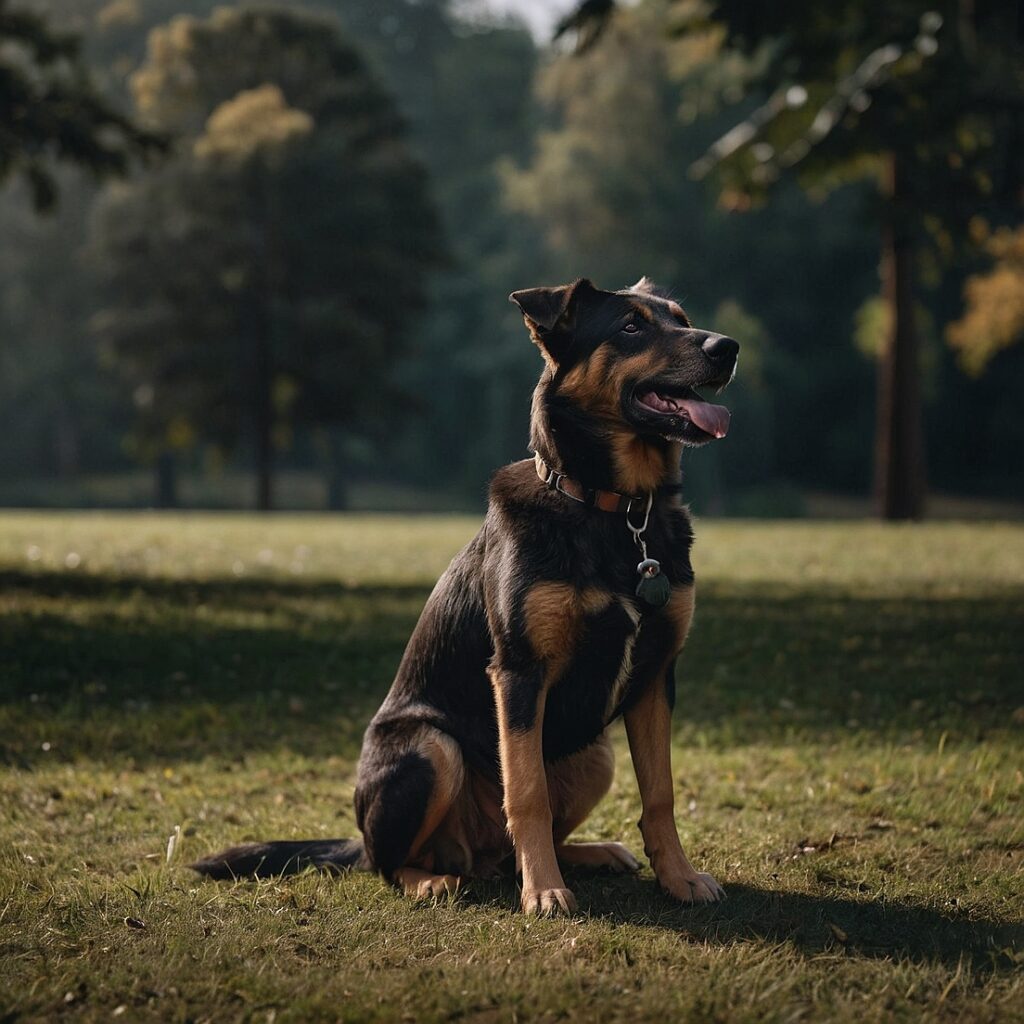
Exercise and Mental Stimulation
A tired dog is a calm dog. Providing adequate physical and mental stimulation with dog training before a holiday gathering can help reduce excess energy and anxiety.
1. Morning Walks or Runs
Take your dog on a longer-than-usual walk or play a game of fetch before guests arrive. High-energy activities in the morning will set the tone for a more relaxed afternoon and evening.
2. Puzzle Toys and Treat-Dispensers
These interactive toys engage your dog’s mind and keep them occupied while you entertain guests. Rotate different toys to maintain your dog’s interest and prevent boredom.
3. Training Sessions
A quick refresher of basic commands with dog training, learning a new trick or agility training can tire out your dog mentally and help them focus. Short, rewarding dog training sessions also strengthen your bond and reinforce good behavior.
Managing Interactions During the Event
Once guests arrive, it’s important to supervise your dog’s interactions to ensure everyone feels comfortable.
1. Control the Introduction
Allow your dog to approach guests at their own pace. For shy dogs, advise visitors not to force interactions and let the dog come to them when they feel ready. Remind guests to remain calm and avoid making sudden movements, which can startle nervous dogs. And if you know you have families that may have multiple dogs, either make sure the new dog gets introduced prior to the gatherings or maybe politely ask your guests to leave the pup at home that day.
2. Limit Excitement
Ask guests to ignore your dog upon arrival until they have calmed down. This helps prevent overexcitement and reinforces calm behavior. You can also use calming aids, like pheromone diffusers or anxiety wraps, to support your dog during busy gatherings.
3. Monitor Children
If children are present, supervise all interactions closely. Teach them to respect your dog’s boundaries and avoid behaviors like hugging, pulling, or chasing. Encourage children to offer treats or engage in simple commands like “sit” to create positive interactions.
4. Keep Treats Handy
Use treats to reward calm and polite behavior during the event. Ask guests to participate in this positive reinforcement to build trust and good associations. Avoid feeding your dog table scraps or allowing access to food that could be harmful to their health.
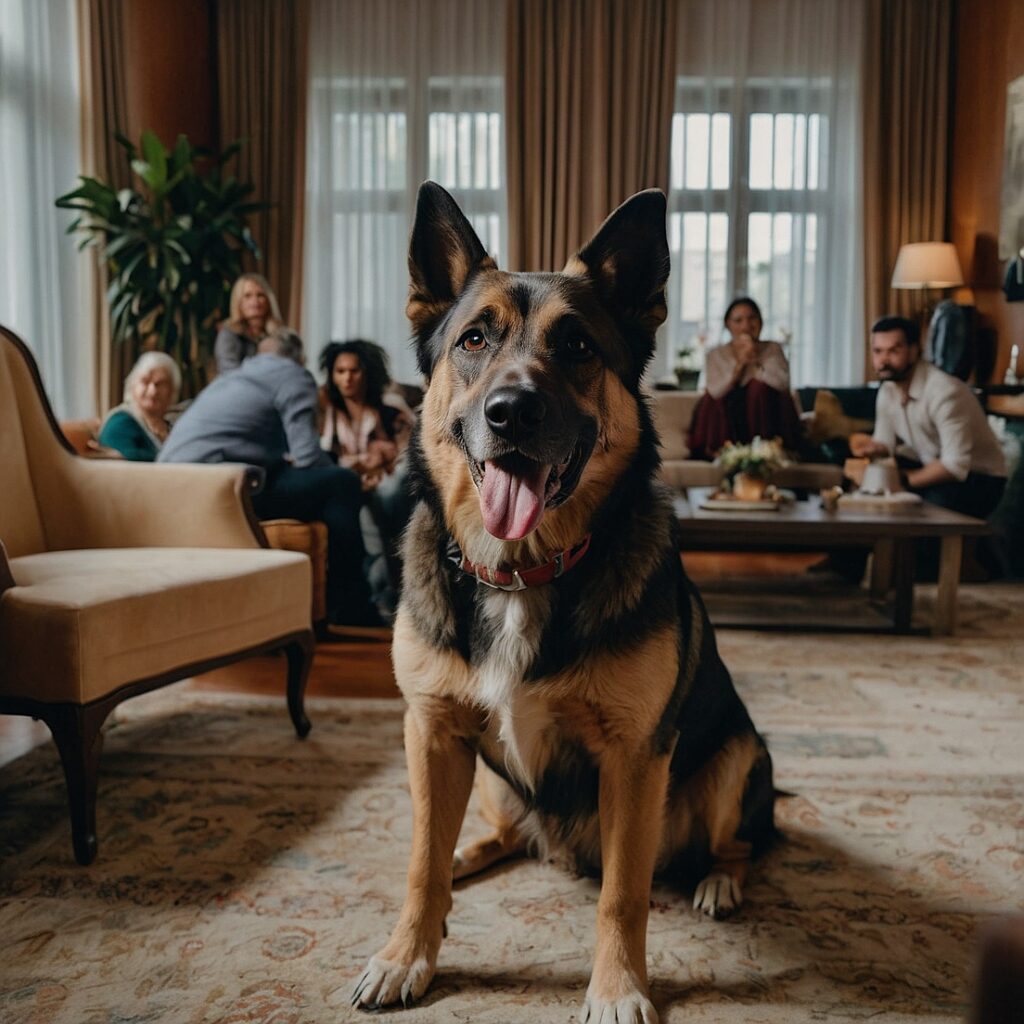
When Challenges Arise
Even with the best preparation, some dogs may struggle to adapt to the holiday environment. Here are strategies to handle common challenges:
- Excessive Barking: Redirect their attention with a favorite toy or take them to their safe space for a break. If barking persists, use commands like “quiet” or “enough,” and reward them when they stop.
- Jumping on Guests: Use the “sit” command and reward calm behavior with treats and praise. You can also keep your dog on a leash during the initial arrival phase to help manage their excitement.
- Hiding or Anxious Behavior: Allow your dog to retreat to their safe space without forcing interaction. Respect their need for quiet time and reassure them with your presence if needed.
- Overstimulation: Take your dog outside for a quick walk or potty break to reset their energy levels. A short break in a calm environment can do wonders to help your dog feel more balanced.
Consistency Is Key
Training doesn’t end once the holidays are over. Consistent reinforcement of the tips above will help your dog develop long-lasting good behavior, making future gatherings more enjoyable for everyone. Practice commands regularly, reward positive behavior, and remain patient with your dog as they continue to learn. And to get even more practice get them into doggy daycares or with a dog trainer so you pup can continuously learn to be around other dogs or learn new commands to help your overall dog training efforts.
Dog Training Holidays: Seek a Professional Dog Trainer When Needed
While at-home dog training can be effective, some dogs may benefit from expert guidance to fully address their needs. If your dog struggles with anxiety, excessive excitability, or behavioral challenges, Performance K9 Training and Boarding can provide the support you need from puppy needs to more advanced training.
And for what you maybe looking for your dog training holidays with Performance K9 Training and Boarding, you may want to look at their Basic Behavior Modification Program is tailored to help your dog develop better manners and cope with stressful situations. With professional dog training, you can ensure your dog is prepared for holiday gatherings and beyond. Training professionals can also provide additional strategies specific to your dog’s temperament, helping you create a comprehensive plan for long-term success.
By combining at-home strategies with expert training with Performance K9 Training and Boarding, you’ll create a harmonious environment for both your dog and your holiday guests.



